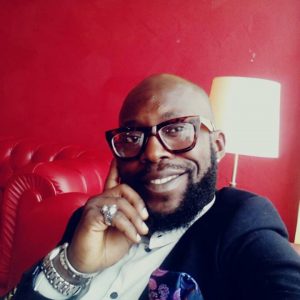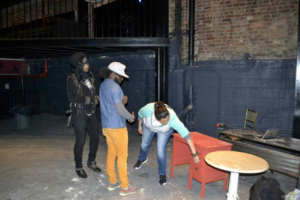Source: Inspireafrika
Press Text: CHIFOR (TITO) VALERY: “WE HAVE BEEN TAUGHT THAT THE FOREIGN CULTURE IS A BETTER CULTURE. FROM THAT NOTION, EVERYTHING ELSE FALLS APART”
BY IA TEAM
In 2017, he was part of “Everytime I ear di soun”[1], a sound project of Documenta, one of the biggest modern art exhibitions in the world. From New York to Berlin through Athens, Dakar, and many other big cities, Valery (Tito) Chifor broadcasts his own vision of art, pushing up the agenda of African consciousness.
This passionate activist is an “energizer”, and a force to be reckoned with when it comes to the media and art sphere in Cameroon. For the past ten years, he has celebrated and amplified African talents and stories through radio (Equinoxe, BBC, Nostalgie), television (STV, Boom TV), production (IDEA LTD), writing, photography (6 exhibitions since 2010), brand training and motivational speaking. His frankness and his anti-conformism did not always bring friends in his life, but as he used to say, “staying true to yourself is the only way to have a free mind”.
2018 stands out as a significant year for this cultural lover. Recently admitted to the Wysing Art Residency in Cambridge, he looks forward to a collaboration with Ivor Stodolsky and Marita on the project “Artists At Risk”. He will also do multiple sound and visual projects with kids and artists from “oppressed backgrounds”, and will probably finish the year with a 7th exhibition in New York. We had a long conversation about career, lessons learned, and the African music industry.
 You started with law studies, but ended up gaining popularity within the Cameroonian and African media in the course of 10 years. You have interviewed artists like P-Square and Oumou Sangaré. Why did you decide to change your career path and how did you manage to distinguish yourself?
You started with law studies, but ended up gaining popularity within the Cameroonian and African media in the course of 10 years. You have interviewed artists like P-Square and Oumou Sangaré. Why did you decide to change your career path and how did you manage to distinguish yourself?
That’s an interesting question. The truth is, the art of speech has always been part of my life. I remember being on National TV when I was 9 or 10, doing debates in Becky Ndive’s TV Show. As far as I remember, I’ve always been very good at speeches. As a lawyer, my idea was to become one of those famous and eloquent lawyers I saw on TV. But when I started my internship in a law firm, I discovered that I was not in my place. I felt like I was playing a role. Then I found out I could use my gift to tell people stories. So the day I decided to drop my law studies to start a career in media, it was a natural switch. It was also a huge risk at the time, and I have paid the price for that choice, by sacrificing many privileges.
My passion helped me a lot. Being on the ground, researching, working hard…Passion is a ticket to the world. Everywhere you go, no matter where you come from, if you are passionate enough you will always stand out, because passion is strong and spiritual. It comes from the bottom of your heart, you don’t fake it.
I strongly believe that even if we might not change the world, we should at least inspire our peers. We live in a difficult society. Standing out is not easy, especially considering the working and living conditions in Cameroon. I am a testimony that you can actually impact people no matter how the environment is. That is what makes me different.
Also read : Radio, the heartbeat of Africa
In 2015, you made a photo exhibition showing the daily life of Boko Haram victims in the North of Cameroon. Today, you seem more interested in Art, precisely in photography and writing. What do these represent for you ?
I want to bring those areas to another level. I’ve always wanted to do social journalistic photography, almost like reporting,

With Tracey Rose (South African visual & Performance artist.) and Lemar (Gothic singer) at Black Lady Theatre in Brooklyn.
with an aesthetic dimension. Photography is important to me because it’s another branch that helps me express myself differently. It’s a huge challenge, because its difficult to say everything you want to say in a single picture, a single moment, or a single frame. And that’s the beauty of photography.
Writing is another passion of mine. Even if it’s not books, we all read things. Words last longer when they are written than when they are said. So, I have always wanted to develop writing skills and associate them to my practice of photography. I had the honor to have been commissioned by Tracey Rose, a major artist in South Africa, to write an African perspective on the origins of slavery, how that “displacement” has affected us and how it echoes today. This was my first collaboration as a writer. The project is titled “The Good ship Jesus and the Black Star Line”. This happened in November 2017 in New York.
You are also a motivational speaker. Why is it important for you to share your experience?
The first reason is my mum: she was a very passionate teacher, and I developed that same passion at a very young age.
The second reason is that I did not receive a lot of guidance in my professional life. I have a friend who told me one day: “I cannot follow a person that is taking me to a place where he has never been himself.” We need to look up to people that have been at the places we want to go. Nobody really told me how things were supposed to be done when I started to learn my profession. I had to rely on my curiosity. My parents taught me that when you want to know something, you have to read about it. When we were younger, they used to bring my sisters and I to the British council every Saturday, in order to read. I read everything: history, religion, biology, sociology. So today, it’s crucial for me to share. I remember when I was on STV. Every vacation, I used to train interns and let them host my show. Everybody thought I was crazy. But this was not about competition. It was about opportunity. I am proud that most of them are still on TV today: Stephane Nguifo, Tracy Makogue, etc. A lot of them have became real media professionals.
What is your opinion on the African art industry today?
First things first, let me talk from a consumer point of view and as a person who really likes Africa and its music. On my radio show in Berlin (during the Documenta exhibition, editor’s note), I played exclusive African music from Gabon, Cameroon, Namibia, Lesotho, Kenya, Angola, South Africa etc, and I was particularly proud to share it with the world.
When I look back to our industry for the past years, I am happy and hopeful, because African artists have started to understand the necessity to create conversations through their art. Look at how powerful America became, using Hollywood, Mac Donald’s, Jeans, Michael Jackson etc. They used their culture as a weapon to take control of the world. They fabricated an image and created a conversation. And that is what art is about.
Now let’s focus on the music industry in particular. I think, Afrobeats which comes from Nigeria, is the most dominant genre of African music represented abroad. Why? Because of Nigerian themselves. They really support their art, consume it, and are proud of it. Nigerian artists have understood that they need to get to an international level to be respected. They own the second movie industry on the planet. Nollywood movies are presented in the biggest international festivals. They are making music that is played in the Wembley stadium or on beaches in Greece. This is how strong an African country can be when it’s well organized.
If I have to do a parallel with my country, I will say that Cameroonians need to be more relevant culturally, and more organized. We need to show our real identity, break boundaries, and rules. Some of our artists are already doing it: Jovi, Mr. Leo, Salatiel … These artists showcase our local music and our authenticity.
Some people think that Cameroonian artists have been inspired a lot by Nigerian music and that their music is successful today because of the success of Afrobeats. What can you say to that?
To answer this, we have to go back to the 70s and look critically at African Music back then. In the 70s you had Rumba, with artists like Tabu Ley Rochereau from the Democratic Republic of Congo, you had jazzmen from Johannesburg in South Africa, but you also had a lot of Cameroonian artists known internationally: Manu Dibango, Sam Fan Thomas, Prince Niko Mbarga (the author of “Sweet Mother) …
The problem is the gap between these legends, and our artists today. Did they transmit their legacy to the new generation? What is the relationship between these young people with their music? Our generation know more about Jacques Brel, Dalida, and Claude François than about Francis Bebey, Bébé Manga or Bella Bellow.
We have been taught that the foreign culture is a better culture. From that notion, everything else falls apart, and lead us to “copy” other people because they are on top. It’s not a wrong thing to copy a person who is doing better than you. But you cannot apply his reality to yours. You can be inspired because this person is better, because economically, it’s a more productive business and you want to understand how the business is run. But you must understand that, for you to apply those methods you have to contextualize, which means, you have to make it your own.
So yes of course, we are copying Nigerian stuffs because it works. But the truth is, we don’t need to copy the Nigerians who have actually copied us for years. There are many examples: most of the guitar solos players in Nigeria, are from Cameroon. Prince Nico Mbarga has inspired a whole generation of Nigerian musicians. So if our music can be that strong to influence a generation of Nigerian artists, and we turning back to copy them, we are only copying ourselves …The solution for us is to go back to our basics.
But let’s not also forget one important thing: The Nigerian market is a hundred times bigger than ours and they have been in the entertainment business for ages. It’s not our reality. We should not copy the music; we should copy the way they market their culture. That’s where the value is. It’s not the music that brings the money, it’s the market that brings the money.
Discover Gasha, young Cameroonian emerging singer
Where do you see yourself in 10 years?
I try not to think about it. I don’t want to imagine the world in 10 years, because what I have seen the world become in few years is enough to scare me for the future. I think we should not project ourselves in something that is not permanent. Nothing is permanent. There is always room for change, growth, and empowerment.
That being said, if I stick to the plan, in 10 years, I will have my own radio and TV stations. I want to work with a group of young people who are very educated, full of knowledge, very open minded, and who are working for a common goal: changing the way Africa is being perceived and selling a new narrative for young Africans, to make the world shine.